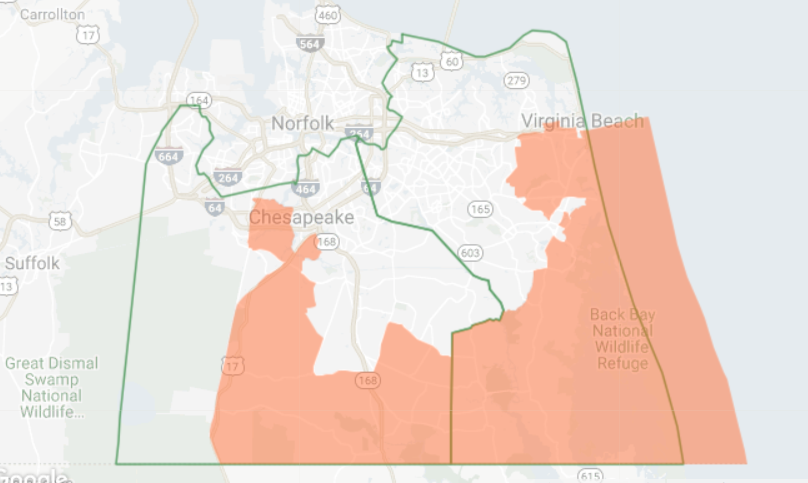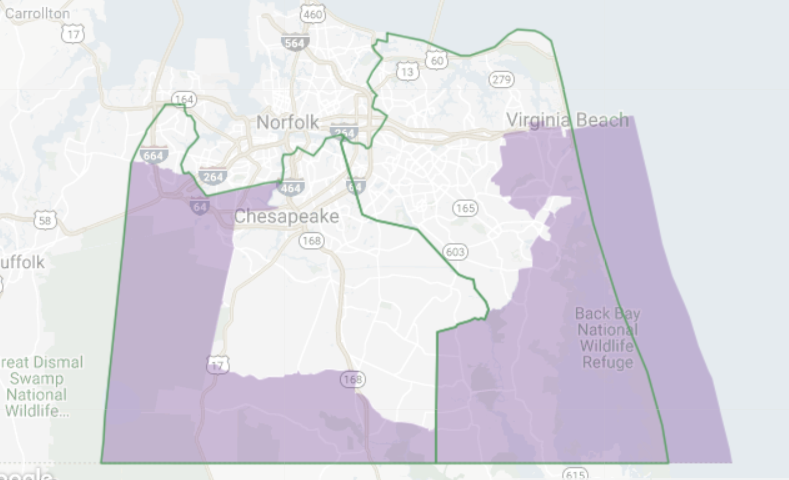
VIRGINIA BEACH – The federal court redistricting plan, which emerged from much wrangling over 11 Virginia House of Delegates districts challenged as racially gerrymandered, means changes for this year’s general election if the U.S. Supreme Court does not intervene.
And other districts that were not at issue in the case also face changes that could make it harder for some incumbents to stay in office because they are affected by the court-backed plan to fix neighboring districts. An analysis by a nonprofit group shows many changes favor Democrats, and some of the revised boundaries impact senior Republicans such as House Speaker Kirk Cox, R-66th District, whose district significantly would shift blue.
Among 25 districts that would change is the 81st House District, represented by state Del. Barry Knight, a Republican and a farmer from Back Bay. The 81st includes much of the rural and coastal Virginia Beach coverage area of The Independent News – communities such as Blackwater, Creeds, Pungo and Sandbridge.
An analysis published by the nonpartisan Virginia Public Access Project found the 81st, a reliably red district in which Knight has outperformed GOP candidates running statewide, would change to include more Democratic voters. The analysis is based upon the 2012 presidential election using calculations from the Virginia Division of Legislative Services.
Stephen Spiker, writing for Bearing Drift in January, noted that Knight “can probably shoulder this shift,” but he added that the district would become more competitive. In an interview, Knight said he is confident in his reelection chances even if the plan goes into effect because voters know him and the area is a close community. However, the court plan would cause his district to change in ways that are anything but close.
The Virginia Beach portion of the district would not change, but lines on the Chesapeake side would shift considerably. The district, shaped like a horseshoe, becomes a much wider one extending through Chesapeake to the Suffolk line while removing communities in the district’s center, including some farmers. Knight noted the irony that one of the criteria for redistricting is compactness. “I’ve got one precinct I’ve had before,” the delegate said, speaking of the precincts in Chesapeake.
According to the Virginia Public Access Project, the 81st currently has a “partisan performance” favoring the GOP of 58.4 percent to 41.6 percent. The federal court plan would change that to 50.4 percent to 49.6 percent, shifting possible Republican advantage from a spread of 16.8 to 0.7 percent, according to the nonprofit. Again, that does not necessarily predict 2019 outcomes because the numbers are based upon a presidential election year.
In the opinion filed in February, the majority of the three-judge panel noted that making changes to challenged districts would impact non-challenged districts, such as the 81st, and that changes were made “while avoiding unnecessary changes to non-challenged districts.” State Republicans have appealed to the U.S. Supreme Court to intervene. The matter was on the docket for the first day of the session beginning on Monday, March 18, and the Supreme Court heard arguments that day.
“We’re going to go to the Supreme Court to say what you’ve done is egregious,” Knight said. “What you’ve done is harmed the Republicans to the betterment of the Democrats.”
In its appeal to the Supreme Court, the Virginia House of Delegates majority argues that the federal court plan “fundamentally alters the political landscape in Virginia” and should be overturned. If the federal court plan stands, Knight noted the new district lines will only be around for two years.
The 2020 Census will come. Redistricting follows in 2021.
POSSIBLE CHANGES IN THE 81ST HOUSE DISTRICT
An analysis by the Virginia Public Access Project of the proposed changes, shown in these maps prepared by the nonpartisan group, shows the 81st House District seat held by state Del. Barry Knight, a Republican, would change in Chesapeake. The horseshoe-shaped district effectively becomes a wider horseshoe. The changes could make it more competitive for Democrats.


© 2019 Pungo Publishing Co., LLC

